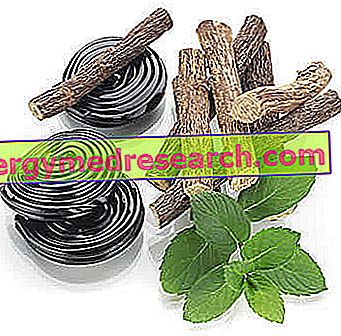What is the black carrot?
The black carrot is a primordial variety of carrot, a biennial herbaceous plant with green stem, with colored root, belonging to the Apiaceae Family, Genus Daucus, Carrot Species; in particular, the black one belongs to the subspecies sativus, variety atrorubens . In botany, therefore, the black carrot is identified by the nomenclature Daucus carota ssp. sativus var. atrorubens Alef ..

As for the gastronomic use, the black carrot is considered a vegetable or vegetable and is used for recipes that belong to appetizers, first courses and especially to side dishes.
There are wild or wild carrots and domestic or cultivated carrots. The black carrot is a domestic variety; initially it spread to the Asian continent, where with the passage of time they have been partially replaced by the orange western ones. However, thanks to their nutritional content (and marketing), today they are regaining importance until they reach Western users.
More difficult to grow than the orange ones, due to the greater climate requirements, in Italy they are not produced or only marginally; the most famous modern Western typology is undoubtedly the Spanish of Cuevs Bajas.
Origins of domestic carrots
Wild carrots are widely distributed throughout Europe, Asia and North Africa; of white color and bitter taste, they are even considered a weed species.
The domestic ones, instead, originally of a dark purple type, were born between Afghanistan, Pakistan, Turkey and Syria 5, 000 years ago. From here they were introduced both in the East and in the West (between the 14th and 16th centuries), favoring the differentiation and expansion (also thanks to the crossing with the wild one) of cultivars that are quite different from each other (black, red, orange, yellow, white).
Nutritional Properties
Nutritional characteristics of the black carrot
The black carrot is a vegetable that belongs to the VI fundamental group of foods. It has a low energy supply, but medium-high if contextualised in the vegetable sector.
Calories are mainly supplied by carbohydrates, followed by small concentrations of proteins and even more minute lipids. Carbohydrates are mainly simple (fructose), peptides with low biological value and unsaturated fatty acids. There are high percentages of fiber and water, while they are absent: cholesterol, gluten, lactose and histamine. This is not a food that is frequently responsible for food allergy.
The quantities of vitamins, minerals and polyphenols, in particular beta carotene (provitamin A, even if to a lesser extent orange carrots) appear, potassium, zinc and anthocyanins.
In April 2011, the "Journal of Agricultural and Food Chemistry" published a study that looked at anthocyanin content in four varieties of black carrots: Antonina, Beta Sweet, Deep Purple and Purple Haze, finding levels between 1.5 and 97.9 mg / 100 g. Moreover, from the same study a possible negative correlation emerged between the presence of anthocyanidins in the diet and the onset of Alzheimer's disease and cancer; during chemotherapy, these molecules could counteract the damage to healthy cells. The anthocyanidins of the black carrots are believed to have mild antibacterial and antifungal properties; the oil extracted from the seeds of the plant, applied to the scalp, is useful to combat itching and to strengthen the hair.
Black carrots can be inserted in any food regime. They have no contraindications for the diet of overweight and metabolic pathologies; except for the specific allergy, they are also relevant in the nutritional schemes against all forms of intolerance (celiac disease, lactose intolerance and histamine).
It is also a foodstuff particularly indicated for the food therapy of people at high metabolic risk (hypercholesterolemics, hypertriglyceridemics, hypertensives, type 2 diabetics and affected by metabolic syndrome).
The combined antioxidant action of beta carotene and anthocyanidins (4 times higher than that of orange carrot) has beneficial effects on the lipid metabolism of LDL cholesterol (bad) and on oxidative stress; consequently, black carrots have a positive effect on cellular aging, tumor prevention, etc. The black carrot is also useful to promote intestinal peristalsis, reduced in the case of constipation.
As a side dish, the black carrot is normally consumed in portions of 100-200g (about 40-80 kcal).

Uses and Recipes
Culinary uses of black carrots
The first carrot-based recipes are ancient. Already in the manuscript "Arte de Cocina" of 1623 (Francisco Martinez Montino) appears the first formula of carrot salad.
Many preparations suggest removing the surface layer with a potato peeler; by doing so they make themselves sweeter, but become depleted of nutrients.
Black carrots are combined with many ingredients. Raw, they prefer seasoning fats of vegetable origin, especially extra virgin olive oil, while cooked can be accompanied with butter or cream.
The combination of raw black carrots and fresh or cooked cheeses and hard and seasoned hard cheeses (grilled, like provola) is excellent.
Raw, they lend themselves to cold fish and meat dishes, such as seafood salads, tartar, carpaccio etc.
Cotte can enrich recipes of stews like meat stews and fish soups.
Very good in the broth, which tends to lightly color, they are also used as an essential element of fried foods.
The sweet taste makes them ideal to accompany cereals, legumes and pseudocereals.
Nor do they clash with eggs, potatoes, other vegetables and fruits.
Among the aromatic herbs and spices they prefer parsley, chilli, turmeric, ginger and cumin. The desserts based on black carrots are also excellent, such as the one with almonds and macaroons (or liqueur).
There are also some very special traditional drinks of black carrots (also fermented) called Kanji and Salgam. Excellent the centrifuged, the extract or the smoothie.



